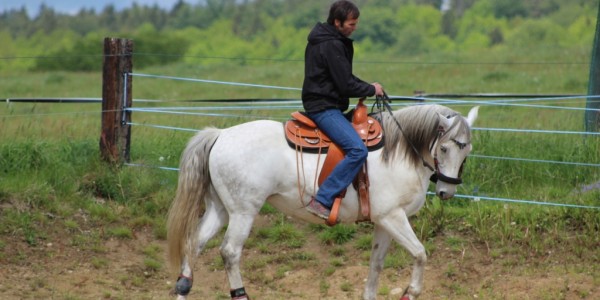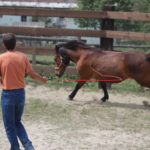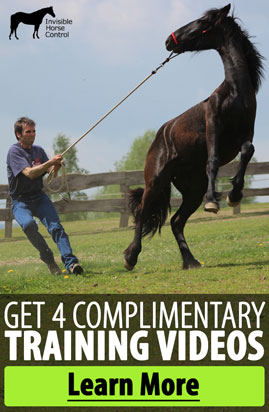Sometimes I meet people that want their horse to listen to them and they only want to achieve it by being nice to their horse under all circumstances. They believe that if they are going to be nice, their horse will be nice to them in return and listen to them.
However in my experience that never happens.
Horses do not understand what being grateful is. They have no idea that such a concept even exists.
So how should you teach your horse to listen to you if being nice doesn’t work? Should you be nasty, and make sure you use a lot of pressure all the time, so your horse remembers who is the boss?
Nope, that would not do much good either long term.
What I believe is right, and what works for me reliably, is to just act in a way that my horse can understand and be as fair as possible.
What does that mean actually?
I always ask my horse to do only the things that he is capable of doing, or capable of learning at the moment. If my horse doesn’t listen, I keep increasing the pressure. When he does what I asked, I release the pressure. Releasing the pressure is the best reward for your horse. And it is also the biggest motivation for him to keep listening to what you ask, and react quicker and on less and less pressure.

Pin this article on your Pinterest!
Let me give you an example:
When I was learning to ride on horses my coaches taught me that I can get my horse on the bit and collected by playing with the reins and urging him with my legs. I have also been told that after I get my horse on the bit, and get him “collected”, I have to maintain the pressure, and keep on pulling the reins, because my horse would otherwise break and I would have to get him collected all again, which would be difficult.
And it really was true, by that I mean it was difficult to get my horse back on the bit and collected.
It was simply because my horse knew that if he does what I am asking he will have to bear the pain of me pulling the reins and kicking him with my legs for another 10 to 20 minutes.
That, of course, didn’t seem all that great in his eyes, so he reacted really badly when I wanted him to get on the bit and collected. It was because he did not know a way to really get rid of my pressure.
Nowadays when I want to get my horse on the bit and collected, I also pull the rein and gently tap him with my legs.
However, everything can be done using ten times less pressure than before.
And that is because now I release the pressure as soon as my horse gets on the bit and collected. And that is it, the only difference is that now I release the pressure as soon as my horse does what I asked.
And it works so much better because it is fair to my horse. If he reacts well, he should get rid of that pressure.
Nowadays it is much easier for me to get my horse on the bit and collected.
And all I do differently is that I release the pressure in the correct moment.
Like this, my horse knows that if he wants to get rid of that pressure he just needs to get on the bit and collected, and he knows that as soon as he does, the pressure will be gone. That is why he reacts well on that pressure. Sometimes a small change can make a big difference.
But of course, if your horse still doesn’t react on the small pressure, you still should increase the pressure until he does.
Because that is fair, he doesn’t do it, then he has to deal with more and more pressure. But of course, as soon as your horse does what you asked, release the pressure to praise him.
So do you now understand what it means to be fair to your horse?
It means that you should be reasonably tough when your horse doesn’t do what you ask, and you should release the pressure and praise him as soon as he does.









